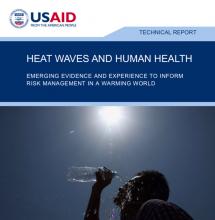Report
Heat Waves and Human Health: Emerging Evidence and Experience to Inform Risk Management in a Warming World

This report from the USAID-funded Adaptation Thought Leadership and Assessments (ATLAS) project examines efforts to better understand and manage the risks of extreme heat on human wellbeing, including the public health burden heat poses and the direct and indirect impacts of heatwaves. The assessment was made in support of the Climate Service for Resilient Development (CSRD) efforts on heat risks.
The report offers a review of existing knowledge on heatwaves and human health around the world including some highlights, such as:
- A focus on the most vulnerable and the role of vulnerability and exposure in heatwave impacts.
- A reference to the fact that heatwaves are among the deadliest natural disasters even though they do not have sweeping visible impacts such as floods and droughts.
- The emphasis that heat extremes are increasing in frequency and intensity and countries need to ramp up preparedness measures to reduce risk.
- Inclusion of the added vulnerability faced by residents of informal settlements.
- A specific reference to the need to fill information gaps throughout Africa.
- The importance of scaling up investments in heat-sensitive urban planning and heat early warning systems, especially in South East Asia.
Download the PDF report and join the conversation on Climate Links – USAID.
Climate Links – USAID, Climate Service for Resilient Development
